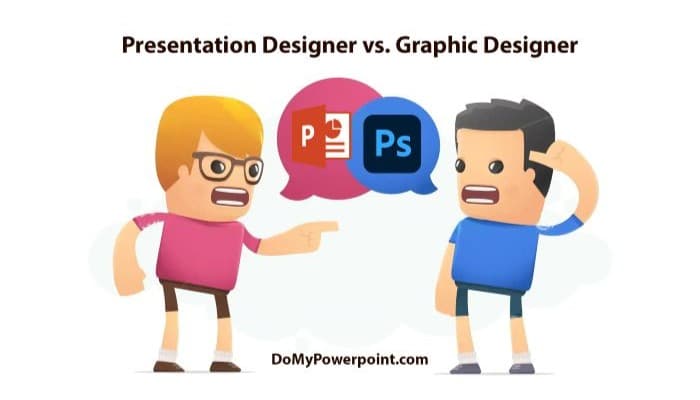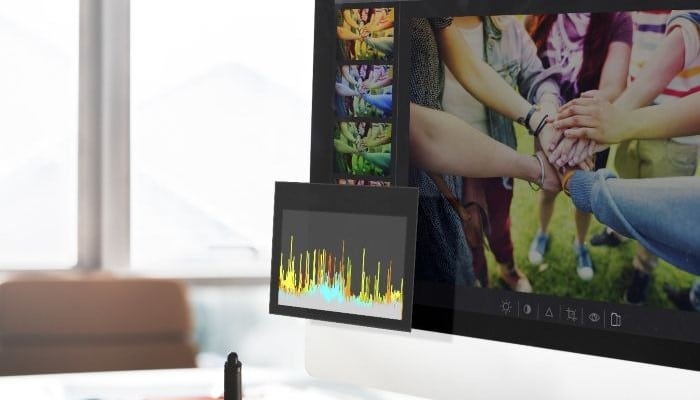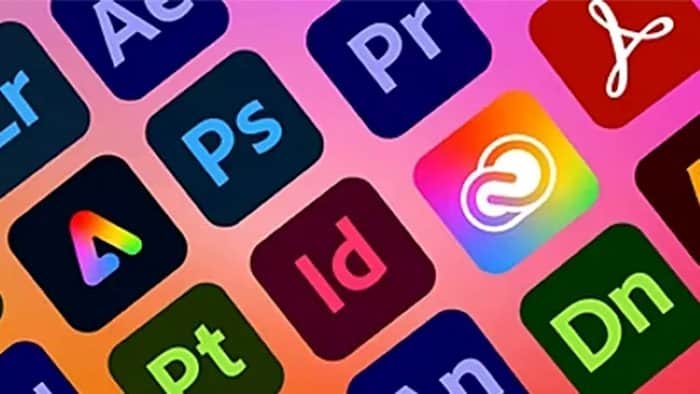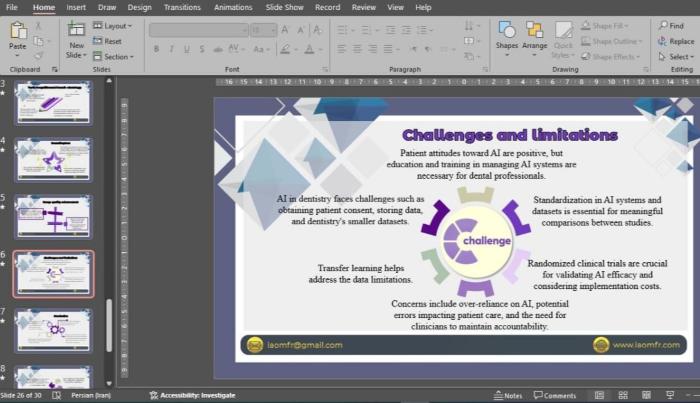Introduction to Presentation Designer vs Graphic Designer
Let’s clear up a common mix-up: presentation designers and graphic designers aren’t the same. The job of a presentation designer is to create slides that support what a speaker says by doing things like organizing information, telling a story with visuals, and keeping an audience engaged.
Graphic designers work on everything from logos to ads, often creating things that can stand alone without a presenter. Both make things look good, but their goals differ.
If you need slides that work hand in glove with a live talk, a presentation designer is your person. For creating a logo or social media graphics, that’s a graphic designer’s lane. This article helps you figure out who to hire so your message doesn’t just look good, but it lands.
| Aspect | Presentation Designer | Graphic Designer |
| Primary Focus | Creating visually compelling slides to support and enhance a speaker’s narrative. | Designing visual content for various platforms, like branding or advertising. |
| Core Skills | Visual storytelling, slide layout, typography for presentations, audience engagement. | Graphic design principles, illustration, branding, and multi-platform design. |
| Output | Slideshows, pitch decks, and business presentations. | Logos, brochures, advertisements, websites, and more. |
| Objective | Enhance communication and engagement during live presentations. | Deliver stand-alone visual content that conveys a message. |
| Target Audience | Business professionals, speakers, educators, and event organizers. | Companies, advertisers, marketing teams, and brands. |
| Tools Used | PowerPoint, Keynote, Google Slides, and specialized slide design tools. | Adobe Creative Suite (Photoshop, Illustrator, InDesign), CorelDRAW, etc. |
Two of the highly sought out design positions in the industry are presentation designers and graphic designers; both with different competencies, experiences, and objectives. This could be anything from preparing a pitch deck for potential investors, launching your brand, or marketing. Understanding the difference in these roles will help you pick out the best designer for the job.
This article explores core differences, skills, and purposes of each role to help understand when you should hire a presentation designer or a graphic designer.
Affordable, Fast, and Top-Quality Designs – Learn More About Do My PowerPoint and powerpoint design services!
Presentation Designer Job
The designer specializing in presentation design will make visually attractive and organized slides to present information efficiently. Beyond general design, presentation design brings graphic elements together with a structured content of walking an audience through logically unfolding stories. This requires a presentation designer with knowledge and techniques of data visualization, layout, and audience psychology to create an engaging yet easy-to-follow presentation.
Presentation designers are responsible for the professional look of a presentation and are focused on the transfer of ideas and messages. An expert in powerpoint presentation designer will work with stakeholders, such as business leaders, educators, or marketers, to determine what the core message and purpose of any given presentation may be. From there they design slides to support that vision through creative, technical skill, and strategic approaches in the organization of information.
For more details on what this job will entail, read the article: What does a presentation designer do?
Key Responsibilities of a Presentation Designer
| Responsibility | Description |
| Content structuring | Organizing information in a logical manner that supports clear narrative flow |
| Visual storytelling | Using Visuals for Comprehension and Attraction |
| Data visualization | Translation of data into graphs, charts, and infographics |
| Brand consistency | Presentation alignment with company’s branding |
| Audience engagement strategies | Create interactions or animations that keep the audience interested and engaged |
Importance of Presentation Design
We are living in a fast-going digital world and presentation design can’t be looked down upon. A well-designed presentation helps, be it for a corporate, academic, or personal venture. It is a fact that information is more likely to stick with you and be more memorable if it’s more graphically appealing.
According to a Harvard Business Review article:
“Effective visual presentation is not about filling slides with as much information as possible but rather about distilling complex ideas into simple, memorable images.”
The value of a presentation designer is not only to make the slides beautiful but also clear and communicative. A badly designed presentation either confuses the audience or sends them to sleep, while good design fascinates and as a result, stays longer in memory. Presentation designers therefore play an important role in reaching presentation goals, be it to inform, persuade, or educate.
High-Quality Presentation Designs at Affordable Rates – Reach Out to Do My PowerPoint!
Must-Have Skills for Presentation Designers
Presentation designers bring their unique blend of technical skills and knowledge in audience psychology. Key skills include:
• Design Software Mastery: Proficiency in Microsoft PowerPoint and/or Keynote; design software such as Adobe Illustrator or Photoshop to enhance visual elements.
• Data Visualization: Understand how to take raw data and render it into visuals that help audiences understand often complex information quickly.
• Storytelling and Narrative Flow: Proficient in crafting the content in such a way to take the audience through a clear visualization of the story.
• Brand Alignment: Ensure all slides are on-brand, in color, font, and style.
Watch the Video below from the Slidesho Presentation Design Agency to learn more about the role of presentation designer:
Graphic Designer Job
The graphic designer creates anything from digital to physical visual assets for various media formats. Sometimes, a presentation may use the work of a graphic designer; however, in this job, branding, advertising, and web design are more often involved. The primary objective of a graphic designer is to create captivating, memorable content that shares a brand identity with its target audience.
Graphic designers work on everything, from logos and posters to websites to social media posts. Quite often, they may be working with a marketing and branding team to make sure the visual touchpoints are aligned and rounded out in a brand’s identity.
Key Responsibilities of a Graphic Designer
| Responsibility | Explanation |
| Brand Identity | Creation of logos, color schemes, and visual styles that express a brand’s personality |
| Advertising design | creating visuals for campaigns, including banners, billboards, and digital adverts |
| Layout Design | Designing the structure and the flow of publications, magazines, and brochures |
| Packaging design | Design of product packages that should be functional and appealing |
| Digital Assets | Creating website graphics, social media content, and more |
Importance of Graphic Designers
Graphic design lies at the very core of brand identity and marketing. As Thomas J. Watson in a Forbes article puts it: Good design is good business,
showing how big the contribution of graphic design could be in lifting the image and appeal of a brand. Graphic designers not only enhance the manner of visual communication but also relate the company to its audience. Whether it be with a logo, an ad, or website design, whatever the medium, the graphic designer’s work inherently becomes integral with that brand’s public persona and its marketing.
A graphic designer’s after-effects go beyond mere creation to actually telling a story that shapes and molds the brand and its identity. This visual identity helps the brand stand out in the competitive marketplace, hence making it easier for the audiences to relate and recognize the brand.
A Graphic Designer’s Essential Skills
Graphic designers can create all types of visual assets because they have been equipped with an array of broad skills. Some primary skills are:
- Familiarity with design software includes proficiency in Adobe Creative Suite applications such as Photoshop, Illustrator, and InDesign-developing both digital and print designs.
- Brand Identity and Design: Knowledge of branding principles to develop coherent and memorable brand assets.
- Typography and Layout: Skillful in arranging text and graphics in a way that enhances readability and aesthetic appeal.
- Creative Problem Solving: Ability to think creatively in solving visual communication problems for different media.
- Understanding of Marketing Principles: Knowledge in advertising and marketing to create visuals that will work to incite consumer engagement.
 Key differences between Presentation Designers and Graphic Designers:
Key differences between Presentation Designers and Graphic Designers:
Skills
While both presentation designers and graphic designers require design software proficiency and an eye for detail, each role emphasizes different skill sets:
| Skill | Presentation Designer | Graphic Designer |
| Slide design | Expert in creating cohesive slide decks | Generally, not focused on presentations |
| Data visualization | Able to present data in graphical format | Good foundational skills, but not the greatest emphasis |
| Storytelling | Skilled in structuring of content for storytelling | Varies by project, whether ad or social media
|
| Brand consistency | sought in maintaining brand in presentations | Very necessary across all digital and physical brand assets |
| Topography & Layout | Competent, can balance text/visual elements | Advanced, with an emphasis on a variety of media |
Purpose
Another difference in these two jobs is their purpose. Presentation designers work to elaborate and emphasize key points within a structured format. They create presentations that effectively communicate information in an organized and engaging manner, perfect for those types of audiences that need clarity and focus.
On the other hand, a graphic designer’s focus would more often than not be varied; work may range from simple designs for social media to product packaging, but the goals are often both branding and direct engagement of the consumer. Communications created by graphic designers play significant roles in developing brand identity, shaping public perception, and messaging in support of marketing and brand goals.
“Professional Presentation Design Made Easy – Connect with Do My PowerPoint Now and see our powerpoint price!”
Outcomes
| Outcome | Presentation designer | Graphic designer |
| Audience engagement | High information engagement and retention rate | Project-based-for advertisements, social media, etc. |
| Brand alignment | Ensures brand cohesion in presentations | Vital for all branded content |
| Clarity of information | Easy simplification of complicated ideas | Relevant, yet not necessarily the key goal in every package |
| Visual appeal | Important but balanced with usability | Identified within all design projects |
When to Hire a Presentation Designer over a Graphic Designer
The right choice of designer spells the success or otherwise of the project. This is why you would like to hire a presentation designer over a graphic designer:
• Corporate Presentation: The slides, designed with the help of a presentation designer, will have a professional outlook and represent the essence of your message while presenting to executives, stakeholders, or clientele.
• Data-Driven Reports: A presentation designer would be able to transform complicated data into visual charts that are more accessible and clearer to understand.
• Product or Service Pitches: Product or service pitching should be clear, well-articulated, and engaging in presenting the idea to potential investors or customers. Look at pitch deck design services at Do My PowerPoint!
• Educational content: Presentation designers design slides required for webinars, workshops, or sessions for maintaining audience interest and enabling learning.
If your intent is logo design, creation of social media graphics, or branding, then a graphics designer is the person for the job. Graphic designers will be able to help create a consistent brand image across all different platforms, which is so vital for long-term recognition and consistency with your brand.
Take a look below for a data-driven presentation sample Designed by our hardworking team at Do My PowerPoint:
Fast, Affordable, and Professional Presentation Design – Request a Free Consultation with Do My PowerPoint!
Conclusion
It’s important to learn what sets apart presentation designers from graphic designers to know which one to hire for your needs. Although both require creativity and skills in design, they have different purposes: Presentation designers create structured and engaging slides that are effective in communicating information, while graphic designers work through various media to establish the visual identity of a brand.
In other words, if your project needs complex ideas to be explained clearly with professional visual flow, then a presentation designer will ensure your message is conveyed as required. If your work is on brand-related visual content or falls under advertisement materials, then a graphic designer’s more diverse skill set will come in handy. The right designer will make a lot of difference in your effective communication and desired impact. Be it pitching a product, bringing cohesiveness to a brand, or simply adding polish to an idea, each one of these could lead you to effective design solutions.
From Concept to Creation – Fast & Affordable Presentation Design Services Await!



 Key differences between Presentation Designers and Graphic Designers:
Key differences between Presentation Designers and Graphic Designers:




Nathan V. Talley
I would like you to talk more about how a presentation designer and a graphic designer collaborate. Overall, that was informative, and I will recommend it to others as well.
Admin
Thank you for taking the time to share your thoughts!
Lee B. Austin
I am a business owner and have worked with presentation designers and graphic designers for various purposes. I guess the difference between a graphic and a presentation designer is not as simple as you mentioned. Over 90 percent of graphic designers are able to design a high-end presentation with guidelines and can acquire the necessary skills. Some points are true, but the border between these two roles is more flexible.
Admin
I really appreciate your feedback—it means a lot!
Lisa F
You could have written more deeply when discussing the required expertise for graphic designers and presentation designers. I, as a design educator, think that graphic designers can also fulfill an acceptable level of professional storytelling and make audience interactions happen. Through specialized training, graphic designers can also learn the principles of visual communication.
Admin
Great insight! Thanks for contributing to the discussion.
M Trawick
That was such complete information! Many people, including me, think that a graphic designer can do the same job as a presentation designer. That’s why whenever I hire a graphic design expert, I find that some marks are missing! For my next project, I will go for a presentation designer. That was so much to me, and thanks a million!
Admin
Your feedback is important, and I’m grateful you shared it!
Beatrice S. Spencer
You did a great job in outlining what an expert presentation design requires, but I doubt presentation design and graphic design are that different. Although presentation design plays a crucial role, PowerPoint and Canva are among the platforms that enable a graphic designer to work professionally on your presentation. Above all, audience engagement and storytelling abilities are beyond the platforms. So, I totally agree with your article to a great extent!
Admin
Appreciate your thoughts! They bring a new angle to the discussion.
Lynne howard
A presentation designer doesn’t just focus on making things look good, but on ensuring that the visual design complements the message. This approach is essential when the goal is to communicate ideas effectively and keep the audience focused on the content.
Davi
I have a graphic designer on my team, and we often rely on them to create presentations. After reading this article, I’m considering whether we need to hire a dedicated presentation designer. Are there certain types of presentations that absolutely require a presentation designer instead of a graphic designer?
Admin
Thanks for the question! If your presentations are more complex, require a lot of data visualization, or are designed for high-stakes situations (like pitches or investor presentations), hiring a dedicated presentation designer is definitely worth it. They specialize in creating clarity and maintaining audience engagement.